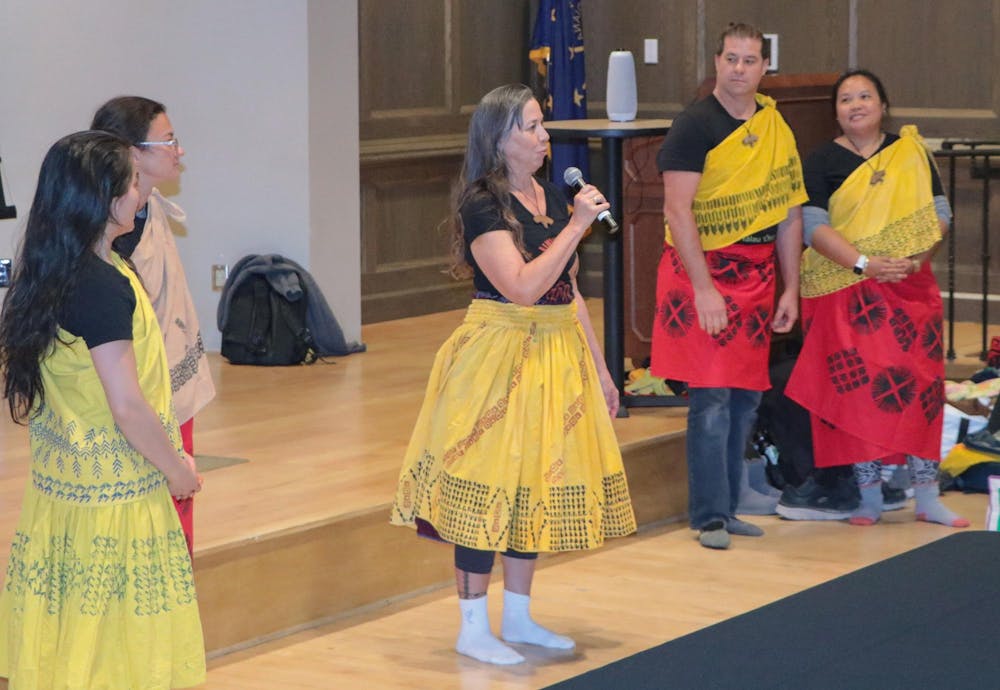IU kicked off its third annual Party for Pasifika event Wednesday with a hands-on ‘Ohe Kapala workshop, marking the beginning of a four-day celebration of Pacific Islander culture.
This workshop is one of the many events planned for Party for Pasifika. This year First Nations Educational and Cultural Center, the Pacific Islander Student Association, the IU Union Board, IU Student Government, Office of Vice President for Diversity, Equity and Inclusion, the Native American Indigenous Studies program and IU Research all came together to host this celebration.
Adin Kawate, native education and programs assistant for FNECC, explained the significance of Party for Pasifika.
“The goal of this event is to celebrate Pacific Islander culture here at IU,” Kawate said. “We kind of want to celebrate where we came from but also share that culture or those cultural practices with the greater community.”
‘Ohe Kapala is an ancient Hawaiian practice that involves carving bamboo stamps to print design on kapa, a type of bark cloth, according to the event page. Students and staff were invited to create their own designs on postcards and paper under the direction of Hālau ‘Ōhiʻa, an ecological kinship program dedicated to cultivating and experiencing Hawaiian lifeways.
“We hope to be sharing our knowledge and how it connects to you in your land and your community,” Hālau ‘Ōhiʻa member Rani Wangsawidjaya said.
In traditional Hawaiian practice, designs made with ‘Ohe Kapala often symbolize one’s journey, but they can also represent one's current life. Kekoa Rosehill, another member of Hālau ‘Ōhiʻa, stamped three different stages of a volcano collapsing.
“I knew nothing of my culture or where I came from, so in 2019 I finally grew the courage to move home,” Rosehill said. “That was one year after Kīlauea, the volcano in Hawaii, had collapsed.”
Rosehill said they called the collapsing of Kīlauea a huli ‘ia, also known as a great overturning or shift across a specific community or landscape.
“It was a representation of what happened to me,” Rosehill said. “Moving to Hawaii and cutting all the ties that I had here was a huli ‘ia event just inside myself.”
After the introductions, event leaders placed attendees into groups and gave them stamp pads, paint and pre-made stamps designed by Hālau ‘Ōhiʻa. They then encouraged participants to use stamps that resonated with them to represent their own lives.
This is the third year that IU has thrown Party for Pasifika. Kawate explains this event exists because of the relationships formed between members of the IU community.
“I like to think of it as sort of like a web or net that holds everything together and lifts everything up. It’s just all these relationships that we have,” Kawate said.
Juniyah Nazaire, treasurer for PISA, said she experienced a “culture shock” moving to Indiana her freshman year of college after living in Hawaii her entire life. Seeking relationships in PISA was her way of connecting back to home.
“Once I found that there was a student association here, it was like my second home,” Nazaire said. “Being out in the Midwest, very far from Hawaii, you can feel very secluded. I find it very beautiful to see everyone coming together and to know you’re not alone.”
According to IU’s institutional analytics, less than 0.1% of the total of degree seeking students at IU Bloomington are Pacific Islander. Kawate hopes others can take advantage of these events to connect with this community.
“Being in the Midwest, you do not get authentic Pacific Islander anything,” Kawate said. “So, this is a really huge opportunity for people at IU right now to experience Hawaii or Pacific Islander culture.”
On Thursday, another workshop took place at the Indiana Memorial Union where attendees learned the practice of Hei, creating string figures.
Additionally, an Oli, a traditional Hawaiian chant, workshop is set to take place followed by a traditional ceremonial dance workshop known as Haka on Saturday at Maxwell Hall. The Oli workshop will begin at 1 p.m. and the Haka workshop will begin at 2:45 p.m. The night will end with a Kanikapila dinner and celebration in Alumni Hall beginning at 7:30 p.m. RSVPs are recommended but not required.






